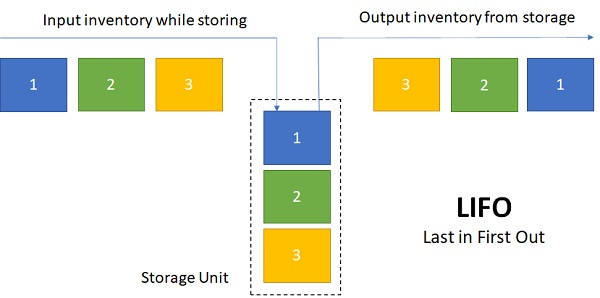- Business Concepts ›
- Operations and Supply Chain ›
- LIFO (Last In First Out)
LIFO (Last In First Out)
Definition, Importance & Example
This article covers meaning & overview of LIFO (Last In First Out) from operations perspective.
What is meant by LIFO (Last In First Out)?
LIFO or Last In First Out is a type of inventory management in which the last item stocked, is the one taken out first in case any of the items is to be used. Under LIFO, the goods are mostly stacked in such a way that the first ones stored are the last to be used. This can mostly be done when non-perishable goods are to be stored, so that the one's stored first do not lose value.
Importance of LIFO
Inventory management is a critical process in handling & storing of goods. Storage of surplus goods or raw materials are important in ensuring a smooth flow of goods. LIFO or last in first out is a mechanism of storage, where the goods which are stored last are to be used first. This technique is primarily used whenever non-perishable goods are being stored. In LIFO, the goods which are first are expected to be used at the end while the ones stored outside are to be utilized first. The other method of storage is FIFO or first in first out.

Advantages of Last in First Out
Some of the main benefits of LIFO are:
1. Non perishable goods can be stored or stacked as and when they come thus saving time.
2. Since goods stored are not for immediate consumption, they can be stored for long without depreciating their value.
LIFO Example
1. One simple example of LIFO is a stack of plates. Assume 10 plates are stacked one over the other. The plate which is placed at the top or at the last is always the one to be use first. This becomes a concept of last in first out.
2. Suppose a warehouse follows a LIFO system. It received 300 packets in 1st month costing $100 each and 200 packets of the same material costing &150 each the next month(because of certain other reasons). Now if there is an order of 250 pieces with a selling price of $125, then;
The items sold will the last 250 that were brought in- So the cost bore would be
200 x $150 + 50 x $100 = $30000 + $5000 = $35,000
While , selling price, 250x $125= $31250
Hence if LIFO is used and the manager doesn’t know about it , his firm will end up in a loss $31250 - $35000= (-) $3750.
Hence, this concludes the definition of LIFO (Last In First Out) along with its overview.
This article has been researched & authored by the Business Concepts Team which comprises of MBA students, management professionals, and industry experts. It has been reviewed & published by the MBA Skool Team. The content on MBA Skool has been created for educational & academic purpose only.
Browse the definition and meaning of more similar terms. The Management Dictionary covers over 1800 business concepts from 5 categories.
Continue Reading:
What is MBA Skool?About Us
MBA Skool is a Knowledge Resource for Management Students, Aspirants & Professionals.
Business Courses
Quizzes & Skills
Quizzes test your expertise in business and Skill tests evaluate your management traits
Related Content
All Business Sections
Write for Us